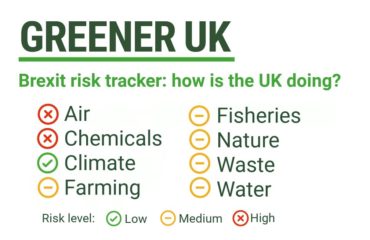5 governance principles for making environmental law after Brexit

Standards and policies set at EU level play a central role in the protection of the UK’s flora, fauna, air and water quality. As the UK prepares to leave the EU, we need to consider the future evolution of our own ambitious environmental standards and policies. There will no doubt be noisy battles over detailed environmental rules, case by case. We also need to do some work on the more easily overlooked question of the principles of governance that will drive environmental standard setting across the board.
Existing EU environmental law is to be ‘retained’ after Brexit by the Withdrawal Bill. Although there may be some gaps, the basic framework will be in place. But environmental law cannot stand still, and detailed standards, as well as overarching policy, will need to be developed.
Much necessary attention has been paid to ensuring that government implements environmental standards after Brexit. The Secretary of State’s promise of consultation on a new environmental body to hold government to account has provided real grounds for optimism. Of course, the detail of such a body is crucial: what are its powers and functions? How will it be funded? Who will it report to? How will its independence and expertise be guaranteed? What will its relationship be with other actors, including members of the public and the courts?
Without taking the future of accountability for granted, it is now time to turn to another aspect of the governance conundrum. In the absence of an ambitious, state of the art and well-developed set of environmental laws and standards, the new environmental body will be a distraction. And in addition to the case by case debates, some overarching governance principles for environmental norm generation are needed.
Setting environmental standards in the EU
Environmental standards and long term environmental policy are currently developed at EU level, using the shared expertise of the Member States and the EU institutions and bodies. Legislation through directives and regulations is subject to joint decision-making by the Member States in Council and the European Parliament, acting on a Commission proposal. Elaborate processes are in place for the development of more detailed standards. Numerous expert committees are in place, open consultation of some sort is generally expected, and sometimes a narrower but deeper consultation involves representatives of the public, private and NGO sectors negotiating detailed norms to fill out legislative standards. The environmental principles found in the Treaty on the Functioning of the European Union are supposed to guide and shape the development of EU environmental law and policy, legitimising and incentivising high environmental standards.
Governance principles for setting new environmental standards
The EU approach to environmental decision making is not perfect, but it does call on well-developed institutional arrangements. Careful thought must be given to domestic capacity, and to the governance mechanisms that will replace the responsiveness, and the democratic and expert contributions at EU level. A range of institutions is likely to be involved, most obviously Parliaments and assemblies, central and local government and non-departmental government bodies such as the Environment Agency and Natural Resources Wales. New institutional arrangements may be necessary. The precise role of each of these bodies will vary, depending on issues such as significance, urgency, subject area and level of detail. Without any claim to comprehensiveness, five governance principles might guide the future development of environmental law and policy.
1. Broad inclusion
A diverse range of interests should be involved in developing environmental standards. Open consultation is an important part of that, as may be more detailed discussions including environmental and industrial groups. This should be coupled with a mandatory explanation, by the public body making the decision, of the balance of consultation between different interests, of who was consulted, what was said, and how observations were taken into account.
2. Scientific evidence
Environmental standards should take account of the latest scientific evidence. Environmental protection depends heavily on scientific and technical knowledge, and regulation should reflect our constant learning.
3. International and European Standards
Those developing new environmental standards and policies should have regard to international and EU standards. This is in addition to the UK’s obligations to comply with international law, and beyond any (possibly extensive) obligations in a future trade deal to comply with evolving EU environmental rules.
4. The environmental principles
Ambition should be reinforced by setting standards in accordance with established environmental principles. The principles in the EU Treaties include the precautionary principle, a high level of protection, and the polluter pays principle. We should not be naïve about either the political or legal strength of these principles, or the way their meaning will evolve. Experience in the EU has however taught us that the environmental principles are capable of underpinning judicial review, and in any event, have the potential to shape and guide the development of the law. New UK environmental governance frameworks could simply take on the existing EU principles, or could pick and choose. New principles, such as a non-deterioration principle, not found in the EU Treaties, could be added.
5. Reporting
And finally, the public authority responsible for taking decisions should report against each of these principles, explaining how they were incorporated into the law and policy making process in each case.
EU environmental law is embedded in a dense governance framework that shapes and drives environmental protection. The need to develop governance frameworks that will ensure the accountability of government for its environmental commitments, is now firmly on the agenda. Governance frameworks for the development of those environmental commitments, including obligations to consult and report, are equally important, both for environmental protection and for government accountability. The five governance principles outlined above are offered as a starting point for a conversation about the framework within which we expect domestic environmental norms to be developed and assessed.
About the author
Maria Lee is Professor of Law and co-director of the Centre for Law and Environment, University College London.
Image used: 5 Chicks, M&R Glasgow




